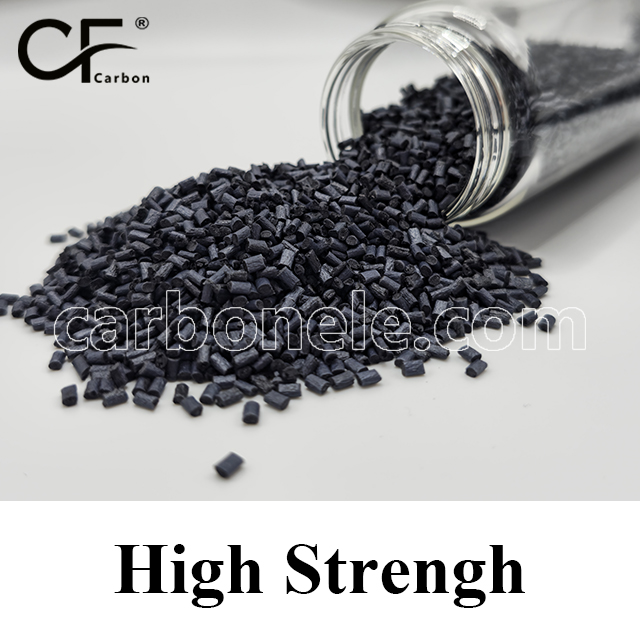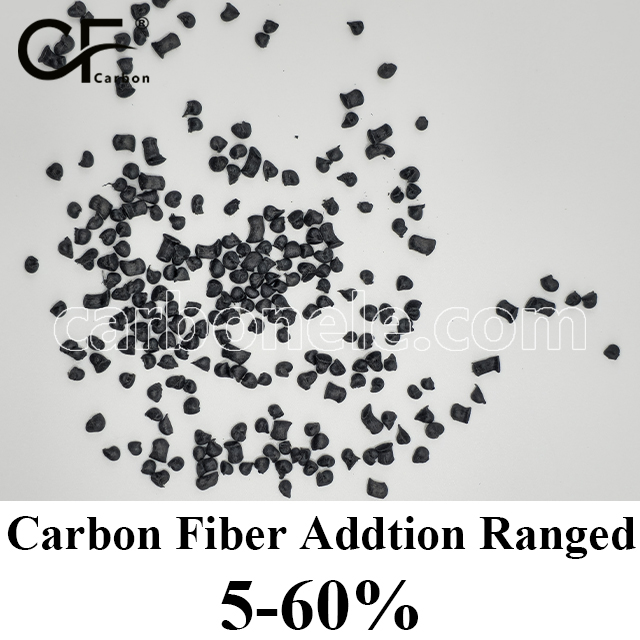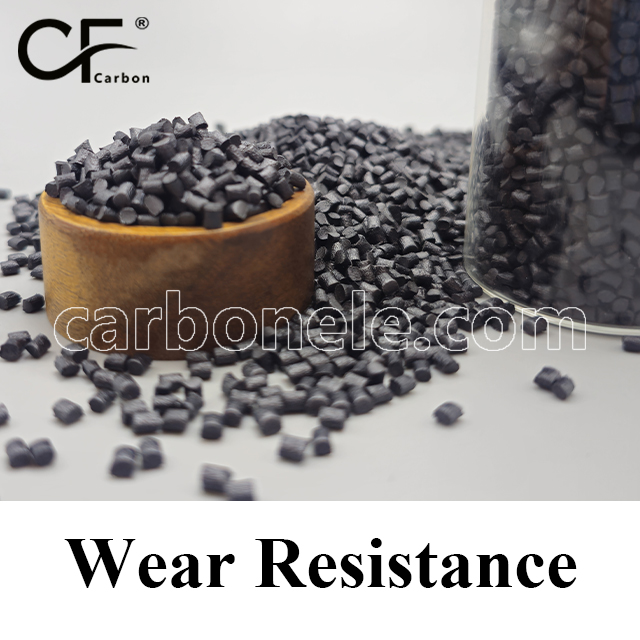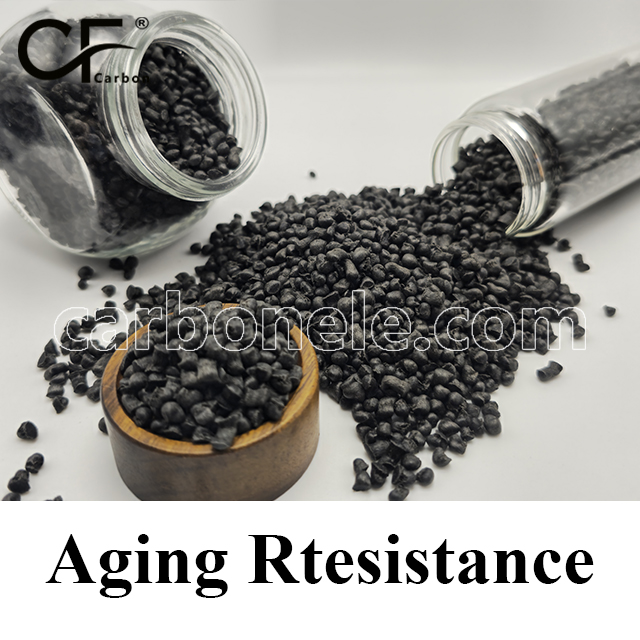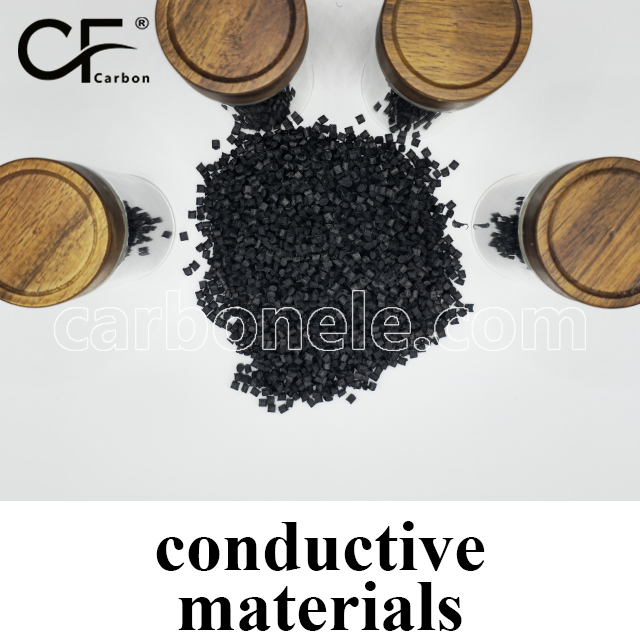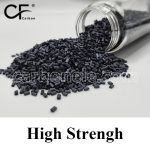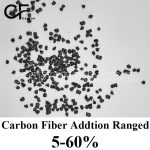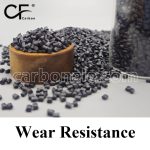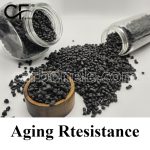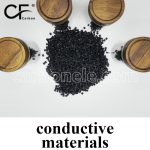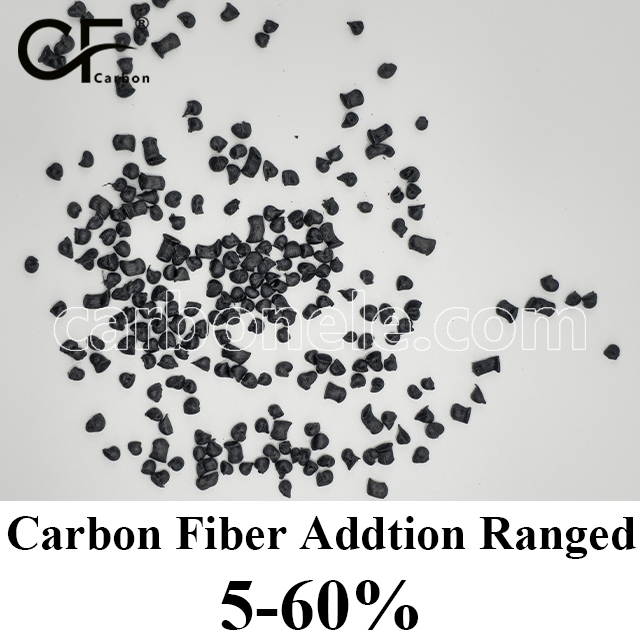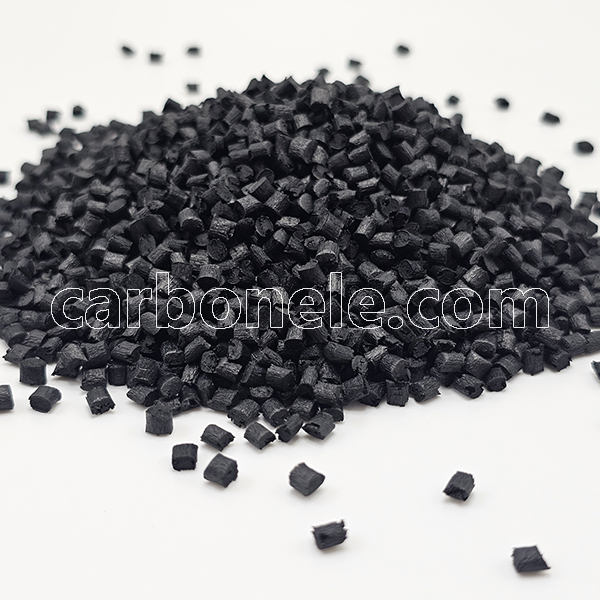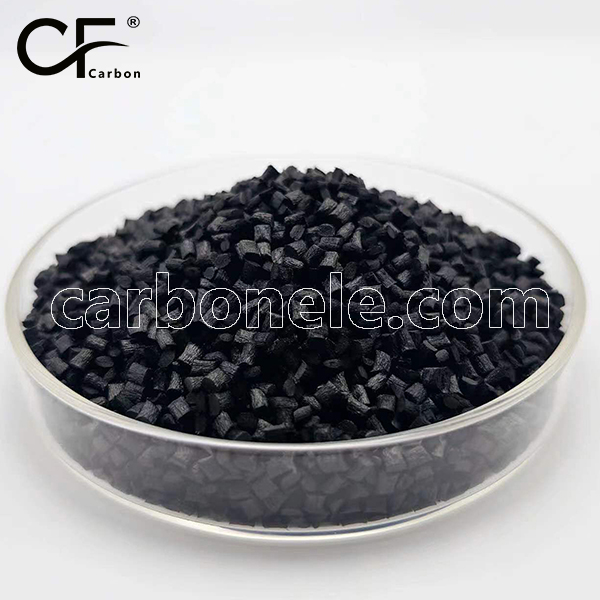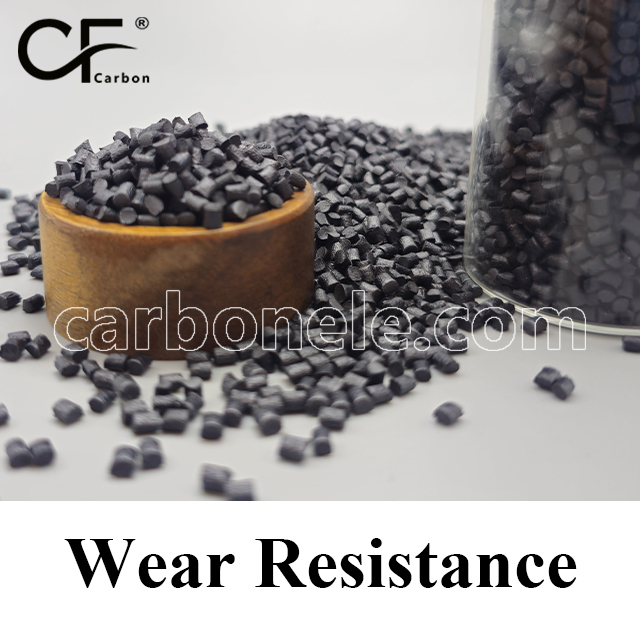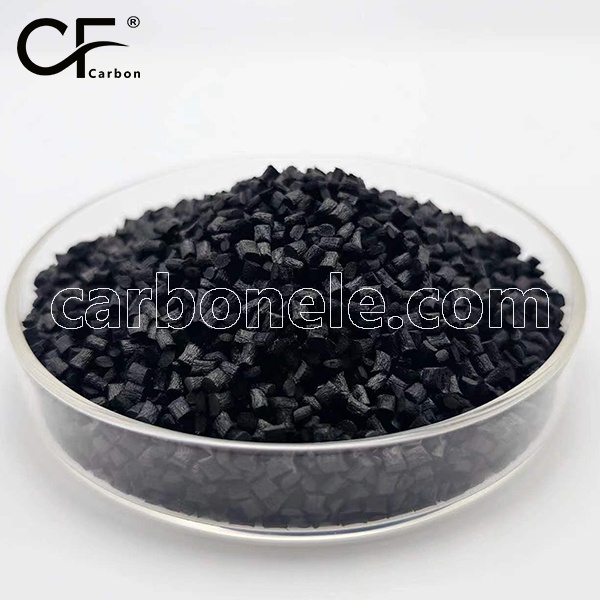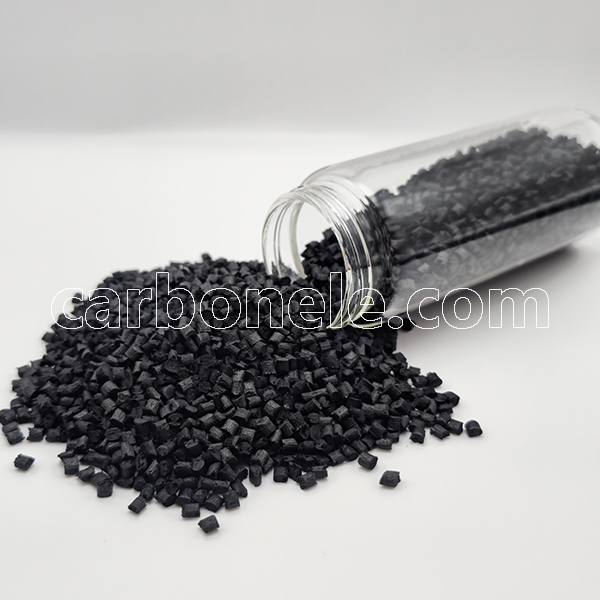
Wear-resistant and self-lubricating PA12-CF10
- Model number: PA12-CF-BCA1
- Matrix Resin: Polyamide12 (Nylon12) (PA12)
- Reinforcing Filler: Carbon fiber
- Appearance: Granules
- Grade: Injection/extrusion grade
- Packaging: 25kgs/bag
PA12-CF10 | 10% Carbon Fiber Reinforced Polyamide 12
PA12-CF10 is a next generation engineering thermoplastic that combines the inherent flexibility, low moisture absorption, and chemical resistance of Polyamide 12 (PA12) with the mechanical reinforcement of 10% carbon fiber. This composite offers a superior balance of high strength, stiffness, impact toughness, and environmental durability, making it an excellent choice for demanding applications across the automotive, aerospace, machinery, electronics, and consumer product industries.
The increased carbon fiber content forms a more robust internal reinforcement network, significantly boosting load bearing capacity, dimensional stability, and thermal endurance—while keeping the material lightweight and relatively easy to process. PA12-CF10 is an ideal alternative to metals or heavier thermoplastics where performance and weight reduction are both critical.
Key Material Benefits
Mechanical Reinforcement
Carbon Fiber Content: 10%
A higher concentration of carbon fibers uniformly dispersed to deliver enhanced mechanical strength and precision dimensional control, without compromising processability.
Tensile Strength: ≥ 85 MPa
Capable of withstanding even greater tensile loads, offering improved structural integrity under both static and dynamic stresses.
Flexural Strength: ≥ 120 MPa
Provides excellent resistance to bending forces, ensuring components retain their shape and performance under mechanical strain.
Impact Strength: ≥ 9 kJ/m²
Maintains excellent impact toughness, crucial for components exposed to dynamic or shock loading conditions.
Thermal Stability
Heat Deflection Temperature (HDT): ~165°C
Slightly improved heat resistance compared to lower fiber filled versions, supporting use near high temperature zones like engines or industrial equipment.
Continuous Service Temperature: Up to 90°C
Reliable performance in moderate to high temperature operating environments over extended periods.
Environmental and Chemical Resistance
Low Moisture Absorption
Thanks to PA12’s naturally low water uptake and added fiber reinforcement, PA12-CF10 achieves outstanding dimensional stability, even in humid, wet, or outdoor conditions.
Chemical Compatibility
Excellent resistance to:
Automotive oils, fuels, greases
Industrial solvents
Mild acids and bases
This ensures dependable performance in chemically aggressive environments such as vehicle engine compartments, chemical process lines, and industrial machinery.
Processing and Production
Processing Methods:
Suitable for injection molding and extrusion, supporting efficient production of complex, high strength parts at scale.
Flow Behavior:
Despite the higher fiber content, PA12-CF10 retains good melt flow characteristics, enabling thin wall, intricate designs with high surface quality.
Tooling Considerations:
Recommended to use abrasion resistant molds and maintain controlled processing conditions (moderate shear rates and uniform melt temperatures) to preserve fiber length and optimize mechanical properties.
Key Applications Across Industries
Automotive
Structural engine bay brackets and covers
Lightweight crash resistant housings
Fuel and electronic system enclosures
→ Helps reduce vehicle weight while increasing part strength and thermal reliability.
Aerospace
Load bearing lightweight frames and panels
Vibration resistant enclosures for avionics
→ Delivers crucial weight savings and fatigue resistance in aerospace systems.
Industrial Machinery
High load gears, bearings, wear plates
Conveyor rollers and guide systems
→ Resists wear and mechanical stress in heavy duty mechanical operations.
Consumer & Sports Equipment
High performance sporting goods frames
Protective casings for power tools and devices
→ Combines strength, lightweight, and design flexibility for dynamic sports and rugged consumer products.
Electronics & Electrical
Structural chassis for ruggedized electronics
Heat resistant housings for automotive or industrial electronics
→ Withstands mechanical and thermal challenges in demanding electronic assemblies.
Performance Summary Table
| Property | Value / Description |
|---|---|
| Carbon Fiber Content | 10% (Short Carbon Fiber) |
| Tensile Strength | ≥ 85 MPa |
| Flexural Strength | ≥ 120 MPa |
| Notched Impact Strength | ≥ 9 kJ/m² |
| Heat Deflection Temperature | Approx. 165°C |
| Long Term Service Temperature | Up to 90°C |
| Water Absorption | Very low – excellent dimensional stability |
| Chemical Resistance | Excellent – oils, fuels, solvents |
| Wear Resistance | High – suitable for sliding and load-bearing parts |
| Processing Methods | Injection molding, extrusion |
| Surface Finish | Smooth – minimal warpage, high surface quality |
| Dimensional Stability | Outstanding – minimal shrinkage and moisture uptake |
If you want to get more information about PA12-CF10, you can vist our Youtube.
Thermal Stability of PA12-CF
PA12-CF composites exhibit significantly enhanced thermal stability compared to standard PA12 due to the incorporation of carbon fiber. As the carbon fiber content increases, the material's ability to withstand elevated temperatures improves, allowing it to maintain mechanical properties in high-temperature environments. This enhanced heat deflection temperature makes PA12-CF suitable for applications that require reliable performance under thermal stress. The superior thermal stability ensures that components made from PA12-CF can operate effectively in demanding conditions, thereby expanding their usability across various industries, including automotive and aerospace. The combination of lightweight characteristics and improved heat resistance positions PA12-CF as an excellent choice for applications that prioritize both strength and thermal performance.
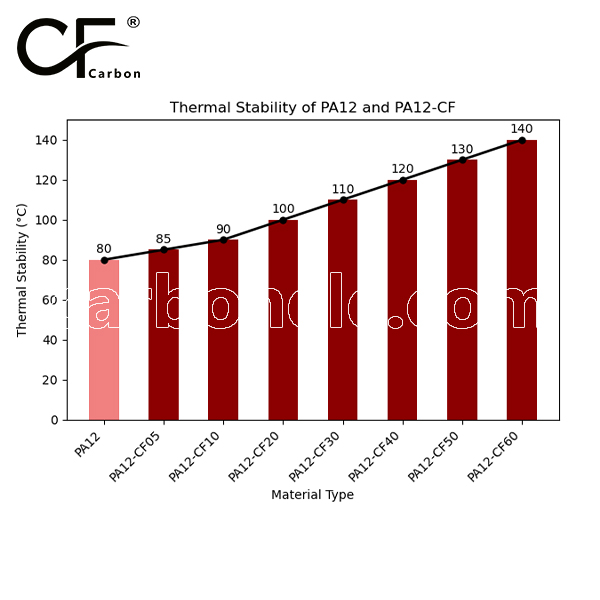
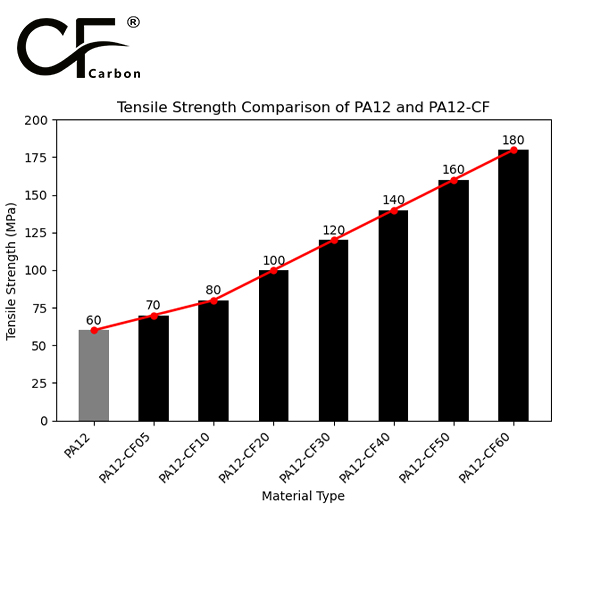

Frequently Asked Questions
Carbon (Xiamen) New Material Co., Ltd. aims to provide buyers with "one-stop" worry-free high-quality services. Here you can find all information about carbon fiber engineering plastics. If you still have questions, please send us an email for consultation!
-
How can I contact the manufacturer of a product that interests me?
When you find a product you are interested in, you can contact the manufacturer directly by sending an email and we will get back to you as soon as possible.
-
How do I find the products that interest me?
All you need to do is enter the keyword, product name in the search window and press the Enter key on your keyboard. Your search results page will then be displayed. You can also search within the product category pages on the home page. Each category is divided into subcategories, allowing you to refine your search and find products that interest you.
-
Where will I find a buying guide?
Please contact our after-sales service directly and we will provide you with a comprehensive operating guide.
-
What are CF Reinforced Thermoplastic Composites?
CF Reinforced Thermoplastic Composites are materials where carbon fibers are incorporated into a thermoplastic matrix. They combine the strength and stiffness of carbon fibers with the processability and recyclability of thermoplastics. For instance, they are used in automotive parts like bumper beams.
-
What are the benefits of CF Reinforced Thermoplastic Composites over traditional composites?
The key benefits include faster production cycles, easier recyclability, and better impact resistance. They also offer design flexibility. An example is in the manufacturing of consumer electronics casings where complex shapes can be achieved more easily.
-
How are CF Reinforced Thermoplastic Composites processed?
Common processing methods include injection molding, extrusion, and compression molding. Injection molding is widely used for mass production. For example, in the production of small components for the medical industry.
-
What industries use CF Reinforced Thermoplastic Composites?
They are utilized in aerospace, automotive, medical, and sports equipment industries. In aerospace, they can be found in interior components. In the medical field, they might be used in prosthetics.
-
How does the carbon fiber content affect the properties of the composites?
Higher carbon fiber content generally leads to increased strength and stiffness but may reduce ductility. A moderate content is often balanced for specific applications. For example, a higher content might be preferred in structural parts of a race car.
-
What are the challenges in using CF Reinforced Thermoplastic Composites?
Challenges include higher material costs, complex processing equipment requirements, and ensuring uniform fiber dispersion. Issues with adhesion between the fibers and the matrix can also arise. An example is in achieving consistent quality in large-scale production.







